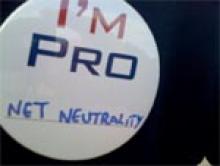Rules Matter - Network Neutrality and Transparency
I was briefly checking out the Open Internet Workshop when I got into a short tweet-argument with someone I did not know. Bear with me as I recount the discussion then explain why I think it worth delving into for a post. This person caught my attention by tweeting, "Which means the Net is already open, right?"
I responded, "Yes Internet is open. Trying to keep it that way. Idea that net neutrality is 'new' is absurd."
Shortly thereafter, I got a response that fits a standard script: "Then how about proving actual harm first? Burden of proof to hand Net to govt is on you guys."
I responded, "Comcast, RCN, Cox block applications ... why must we wait for you to break the Net further to fix it?"
The final response was that the market forces will solve the problem and my "examples are outdated."
I later discovered that I was wasting time responding to someone from an astroturf think tank. Odds are that this person was simultaneously tweeting that cigarette smoking is not correlated with cancer and that burning coal actually cleans the air.
But this is a common argument from those who want to allow companies like Comcast and AT&T to tell users what sites they can visit and what applications they can use. Some "free market" advocate (who is actually defending firms with serious market power, the antithesis of a free market) says that no private network owner would violate network neutrality. Then, when presented with companies that have violated network neutrality, the response is invariably that those are "old" examples" or somehow not relevant.
To sum up:
Person A: No company would violate network neutrality. Person B: What about Comcast, Cox, RCN, and the famous Madison River Communication? Person A: Those don't count.Aside from the absurdity, the larger problem is that we do not always know when companies are violating network neutrality. Comcast was violating network neutrality for at least a year before tech journalists successfully outed the practice. Over the course of that year, many subscribers called Comcast and asked why they were having problems with certain applications. Comcast lied to them and said the company was not interfering with them. When finally backed into a corner with incontrovertible evidence, it admitted it was.



